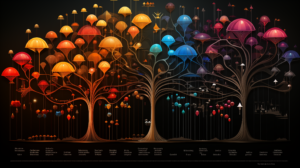AI Imposter Syndrome and the Informed Novice Dilemma
Redefining Expertise in the Age of Artificial Intelligence
Recently, I was having coffee with a former colleague and the discussion eventually turned to AI. When mentioning that I’d used AI tools for doing research, she shared a story that I think captures a growing trend. Her director of marketing had tasked her with creating a presentation based on blockchain, which she knew very little about. Having recently used ChatGPT, she thought she’d start there and see if it could point her in the right direction. After a few days, ChatGPT had helped her grasp the complex concepts of blockchain enough to speak confidently on the subject. However, as presentation day approached she started having serious doubts. Despite her solid grasp of blockchain, she felt like an imposter. Did she really understand blockchain, or was she just parroting what ChatGPT told her?
Her story resonated with me, and on the drive home I began to wonder if this story of doubt and rapid learning has introduced a wider phenomenon in the professional world: AI Imposter Syndrome – that sensation where professionals doubt the authenticity of their AI-acquired expertise. Could the accessibility of information through AI be reshaping our path to becoming an ‘expert’, and is there any value to being ‘expert enough’ in a rapidly advancing, technology-centric world?
With AI simplifying the acquisition of knowledge, how do we redefine genuine understanding and expertise?
Defining AI Imposter Syndrome
Unlike traditional imposter syndrome, which involves doubting one’s achievements and fearing being exposed as a ‘fraud,’ AI Imposter Syndrome centers on questioning the legitimacy of knowledge gained through AI tools. It emerges when individuals use AI to quickly understand complex subjects, leading them to wonder if their newfound expertise, despite being well-informed, is as authentic as knowledge acquired through more traditional methods.
This phenomenon reflects a shift in how we value knowledge in an age where AI makes information so easily accessible. It poses the question: With AI simplifying the acquisition of knowledge, how do we redefine genuine understanding and expertise?
Historical Context of Expertise
Throughout history, the concept of expertise has continually evolved. In the past, mastery in a field typically came from years of hands-on experience under an expert’s mentorship, especially in trades and crafts. This approach gradually gave way to formal education systems, where universities and colleges blended theoretical and practical knowledge.
The rise of technology, however, has profoundly altered this landscape. The printing press first democratized knowledge, breaking the hold of elite scholars on information. Then, the internet revolutionized access to information, making it readily available to anyone who could get online. This instant access to vast amounts of knowledge has blurred traditional boundaries of expertise.
It begs the question: Is true expertise defined by the depth of knowledge gained over years, or by the ability to efficiently navigate and synthesize the wide array of information that technology now puts at our fingertips?
This evolution of expertise is giving us a new appreciation of the changes brought about by the AI revolution, particularly in how we access and process information.
The AI Revolution and Its Impact
The rise of generative AI tools marks a dramatic change in how we access and process information. These AI systems can synthesize incredible amounts of data and make complex subjects easily understandable. For example, ChatGPT can provide on-demand insights on topics ranging from quantum physics to Renaissance art, something that was impossible just decades ago.
This convenience is not without its drawbacks. While AI tools offer on-demand knowledge, it may lack the depth that comes with years of study and personal experience. This poses a dilemma: how do we reconcile the ease of AI-mediated learning with the rich understanding traditionally gained over time? As AI integrates more into our learning and research, striking a balance between accessible information and in-depth personal knowledge will be crucial in defining what it means to be an expert today.
Psychological Dynamics
At the heart of AI Imposter Syndrome lies the ‘informed novice’ – a product of the digital age. These individuals, armed with AI tools, can quickly gain a broad understanding of nearly any topic. Yet, they often lack the depth that comes from years of dedicated study in a specific area. This gap between quick access to information and in-depth learning is what fuels AI Imposter Syndrome. Informed novices might confidently discuss topics learned through AI, but internally, they often question the authenticity of this AI-acquired knowledge.
This leads to a significant internal conflict. On one side is the empowerment from rapidly grasping new concepts; on the other, a nagging doubt about the depth of their understanding. This psychological tension – between the ease of accessing information and the traditional path of deep expertise – is a key aspect of AI Imposter Syndrome. It’s not just an individual struggle; it mirrors a broader cultural shift in our valuation and perception of knowledge in an AI-influenced world.
Redefining Expertise
Historically, the traditional path to becoming an expert meant years of deep study and practical experience in a specific field. It emphasized a meticulous, in-depth understanding of a subject, blending theoretical knowledge with real-world application. However, AI-enhanced expertise is characterized by rapid learning and a broad scope of knowledge across various fields. While traditional expertise offers depth and nuanced understanding, AI-enhanced expertise excels in its breadth and adaptability, allowing for quick pivoting between diverse topics.
Traditional learning is like a deep dive into a specific subject, cultivating a rich, detailed understanding. In contrast, AI-mediated learning is like skimming across a vast array of topics, offering a wide but less deep perspective. The educational challenge we must now face is balancing these two approaches: deep, focused expertise in one area, complemented by a broad, AI-assisted understanding in others.
AI is revolutionizing learning by making it more personalized and efficient. For instance, adaptive learning platforms use AI to tailor content to individual styles and paces. AI also helps synthesize large volumes of information, aiding in processing complex data. Looking ahead, AI’s role in formal education and lifelong learning is poised to grow, changing how we approach continuous professional development.
In this new AI-augmented world we live in, the concept of expertise is evolving. It’s no longer just about depth in a single field but also encompasses the ability to quickly acquire and apply diverse knowledge. This shift is redefining how we view learning and expertise, setting the stage for a deeper exploration of its psychological impacts.
“Being ‘expert enough,’ or possessing functional expertise, means having sufficient understanding to effectively engage with and contribute to new and evolving domains.”
Embracing ‘Expert Enough’
In the rapidly evolving landscape of technology and industry, the concept of being ‘expert enough’ has evolved into what can be termed as ‘functional expertise.’ It emphasizes the ability to acquire a working knowledge quickly across diverse areas. Being ‘expert enough,’ or possessing functional expertise, means having sufficient understanding to effectively engage with and contribute to new and evolving domains. This approach is not only practical but often necessary to keep pace with the constant influx of new information and changing technologies.
The transformation of the workplace reflects this shift. Careers today often require a broad set of skills spanning multiple disciplines, moving away from the linear paths of the past. In such a dynamic environment, functional expertise becomes a valuable asset. It enables individuals to adapt to new roles and challenges quickly, enhancing their versatility and value in the workforce.
This paradigm shift also signifies a change in learning methodologies. The focus is shifting from acquiring static expertise to embracing continuous learning and adaptability. In this evolving educational landscape, functional expertise aligns perfectly with the need for lifelong learning. It fosters a mindset geared towards ongoing education, where individuals are motivated to constantly update their knowledge and skills to stay relevant.
In professional settings, the practical benefits of functional expertise, or being ‘expert enough,’ are diverse. For instance, a project manager can use AI tools to quickly familiarize themselves with the essentials of blockchain, enabling effective oversight of tech-driven projects. This rapid acquisition of knowledge demonstrates functional expertise, allowing them to converse confidently with technical team members and make informed decisions.
The democratization of knowledge through AI tools also enhances accessibility, breaking down barriers related to education level, socioeconomic background, and geography. This accessibility fosters a more inclusive learning environment, allowing more people to develop functional expertise in areas once deemed out of reach.
In conclusion, functional expertise, or being ‘expert enough,’ offers a balanced approach to knowledge and skill acquisition in our information-rich era. It recognizes the importance of being able to learn efficiently and apply knowledge flexibly as vital skills in our ever-changing world. As we look to the future, the implications of this trend for education, professional development, and workforce dynamics are profound, preparing us for a future where AI integration in learning and working redefines our understanding of knowledge, expertise, and success.
Further Reading

I'm a seasoned Digital Strategy professional with a penchant for the ever-evolving world of Generative AI and prompt engineering. When I'm not in front of my computer, I'm usually in the kitchen or playing board games. This blog is where I share insights, experiences, and the occasional culinary masterpiece.




